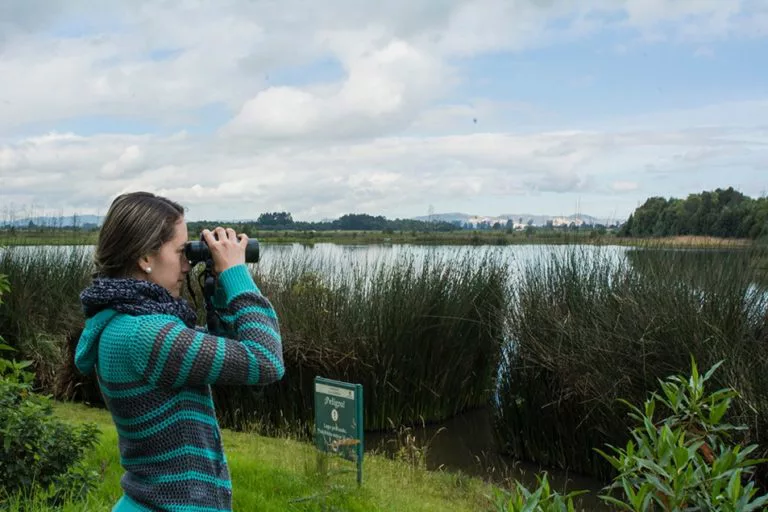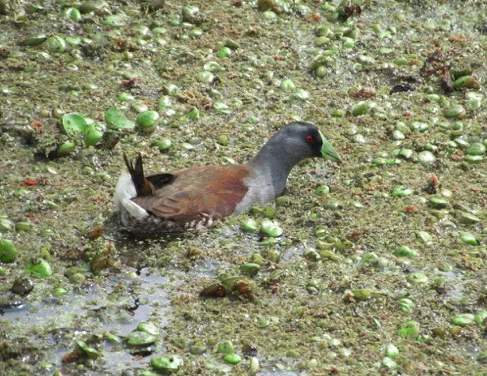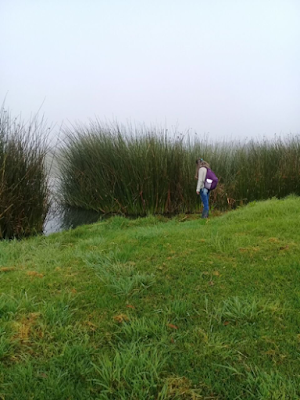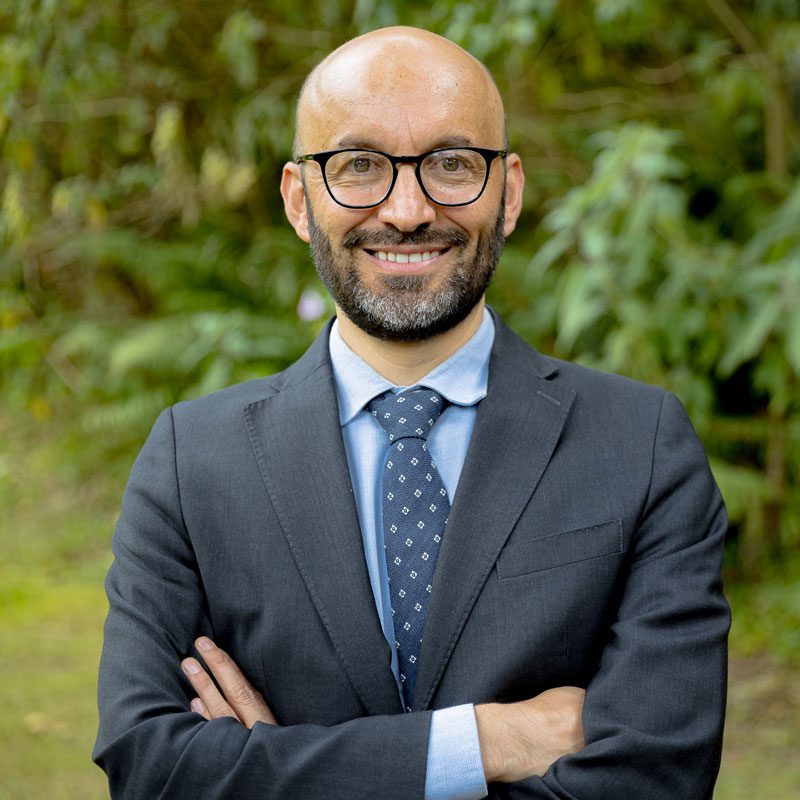Posted on junio 4, 2019 by Comunicaciones Florverde

Erika Milena Sánchez – Colombia Biodiversity Scholar doing field work on a floriculture farm.
The “Spot-flanked Gallinule (Gallinula melanops) –or Tingua moteada in Spanish” is an endemic subspecies found in the Eastern Colombian Mountain Range located in the Cundinamarca and Boyacá departments, and it is considered endangered due to various threats to its natural habitats. Thanks to the project The Birds of the Asocolflores Flowers (Las Aves de las flores de Asocolflores), their presence was identified in the flower farms located in the Savannah region of Bogotá; these farms count on artificial reservoirs of rainwater which provide water mirrors and some aquatic plant coverings that help the birds to feed and survive.
We interviewed Erika Milena Sánchez, the first scholarship holder from the agreement between Asocolflores and the Colombian Biodiversity Research Fund of the Alejandro Ángel Escobar Foundation. She presented the conclusions of her biological research regarding the density of the Tingua in different plant coverings in artificial and natural wetlands in the Cundinamarca-Boyacá region.
You may also be interested in: The Tingua and Florverde
Florverde Sustainable Flowers (FSF): The purpose of the scholarship is to stimulate research on issues related to knowledge, conservation and sustainable use of Colombian biodiversity. Why were you interested in basing the research on the spot-flanked Tingua and getting to know more about this species?

Spot-flanked Gallinule (Gallinula melanops) – Tingua
Erika Sánchez: “I was interested in getting to know the problems faced by this species given that over the last 15 years the Tingua has ceased to be the most common and easy to observe aquatic bird in the wetlands of the Savannah region of Bogotá.
In 2002, it was cataloged as being “Critically Endangered (CR)”; by 2018, the threat had diminished to the level of “endangered (EN)”, but its population continues to face stressing factors.
I am very interested in studying birds and I decided to learn a little more about this subspecies and the artificial wetlands or reservoirs of rainwater found in floriculture farms”
FSF: And what exactly did you find in these rainwater reservoirs?
Erika Sánchez: “The Tingua has no preference between artificial or natural wetlands, as long as it has a water mirror and certain coverings of aquatic, submerged or helophytic, plants to develop its activities. Considering the fact that the natural wetlands have been altered, the artificial wetlands are an option for the conservation of the species.””.
FSF: At Florverde we promote the responsible use of water through various strategies, one of them is the use of rainwater. What do you think is the environmental impact of these actions on the floriculture activity?
Erika Sánchez: “I think it is very important because it generates awareness regarding the responsible use of water; the message is delivered to the workers of the industry and it sets an example for other companies. On the other hand, it creates an additional space for the birds given the intervention that is occurring on the natural wetlands; hence, it is a conservation strategy for the species.”.
FSF: What challenges did you find during the execution of the investigation?
Erika Sánchez: “Initially, it was dealing with the novelty. I had always been interested in birds, but I had never studied them thoroughly. The advice of my director and co-director was vital. In terms of field work, it was a bit difficult to find the bird because it is small (28 cm) and I wasn’t used to identifying it quickly. Over time, you get used to the ecosystem where the sampling takes place. I was able to see 27 tinguas during my research at the four sampling sites.”.
FSF: And what lessons did you learn from this experience?

Erika Sanchez in rainwater reservoirs
Erika: Sánchez: “This research was very important for my training and also for the recognition of natural and artificial wetlands as essential ecosystems for the survival of different species. Likewise, it was an opportunity to recognize that these ecosystems require management to prevent their deterioration due to human activities.
I also learned that these species have a certain degree of tolerance to pollution and to the alterations that occur in the wetlands. Discovering more about this and other species is fundamental for their protection and conservation”.
FSF: Why do you think it is important to continue supporting research on these issues? What more needs to be done in this regard?
Erika Sánchez: “Often, due to economic problems, interesting projects are limited for students. This type of support is very important in order to promote student research.
The support of Asocolflores to more thoroughly study the Tingua helps us understand the idea that many other species are also considered threatened. It allows us to find out more about the species in order to contribute that little grain of sand which helps to preserve them.”.
FSF: What message would you like to share with other students interested in applying for the Colombia Biodiversa scholarship from Asocolflores and the Alejandro Ángel Escobar Foundation?
Erika Sánchez: As students, I feel that sometimes we don’t place enough importance on these scholarships. My message to students who are thinking of applying is “just do it!” Dare to experiment and execute those ideas that we have as students and make them known. Sometimes the fear of being judged in when writing the research stops us taking the first step, but this is a process of learning and improvement.
Written by: Alejandra Laiton – Digital Manager Florverde Sustainable Flowers.
The Colombia Biodiversa research support fund seeks to promote research regarding the knowledge, conservation and sustainable use of Colombia’s biodiversity, through financial support for graduate and post-graduate theses from students of biological, social or related sciences. Learn more at: http://www.faae.org.co/colombiabiodiversa/index.html






